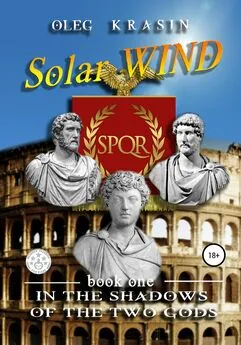Oleg Krasin - Solar Wind. Book one
- Название:Solar Wind. Book one
- Автор:
- Жанр:
- Издательство:неизвестно
- Год:2022
- ISBN:нет данных
- Рейтинг:
- Избранное:Добавить в избранное
-
Отзывы:
-
Ваша оценка:
Oleg Krasin - Solar Wind. Book one краткое содержание
MARCUS AURELIUS ANTONINUS
The emperor-philosopher, for a moment, thanks to him, the world was governed by the best and greatest man of his age.
Solar Wind. Book one - читать онлайн бесплатно ознакомительный отрывок
Интервал:
Закладка:
“I would like to live up to Augustus' hopes,” murmured Marcus, feeling the fragrant smell of Ceionius, the heat of his body, as they lay almost cuddled because of the small size of the palanquin. He continued in an embarrassed tone, “But I'd rather have a quiet lifestyle. I'd be more like to do philosophy than public affairs.”
“Oh, how are you right, my dear Marcus!” Ceionius laughed.
He turned his face to Marcus, and he saw close to himself brown with the yellowness eyes of the new favorite Hadrian. They exuded undisguised curiosity, mockery, and something else that Marcus couldn’t make out, perhaps lust. No wonder there were rumors that Ceionius was known as Hadrian's lover.
“I would also like to live a simple life,” Commodus continued, looking at the young companion. “As Martial wrote, whom I love, ‘May fate not give me a higher share or a lower one, but lead my life in a modest middle way.’ 53 53 Martial "Golden Mean" (translated by F. Petroski), Library of World Literature, Ancient Lyrics, Art Literature Publishing, Moscow, 1968, p.470.
Alas, you have to do your duty, if you want to fate. After all, this is evidenced by the philosophy of the Stoics, which I am taught by the Greek Apollonius. You'll see him soon, by the way.”
Suddenly, from the street, fenced off from the interlocutors by the curtains of palanquin, there was a slurred noise, a loud talk, and then a cry.
“What's going on?” Ceionius was surprised.
He threw back the canopy, and Marcus saw a crowd of excited people surrounding them with stretchers on all sides. People were screaming and waving their arms furiously. The tunic species could be determined that most of them were freedmen, but there were also slaves with collars like animals, which had the usual inscription, “Hold me until I ran away.” Marcus himself did not hang such collars on his slaves. So, Antiochus, walking next to the stretcher, looked like an urban commoner, and not like a slave, only the fur of his tunic was rougher.
Now, in this incomprehensible confusion, Antiochus approached the palanquin and closed it wide with his back from the angry crowd.
“What do they want?” a surprised Marcus asked Commodus.
“I don't know,” the consul replied, lowering his legs down and getting up from the stretcher. “Don't worry about anything, thank the gods, you are under my protection!”
But the crowd was pushing harder. They shouted furiously, pushed the lictors and porters, pushed them closer to the palanquin. Marcus has never seen so much hatred on faces, so much rage, never seen such crazy eyes, it was as if these people had been drugged or had been robbed of their minds by evil sorcerers.
“Bread, bread!” the crowd shouted furiously.
“They demand bread,” Ceionius said with concern. “But after all, we already held the distribution last month, they were given out to everyone according to the lists and there were no complaints. I swear to Jupiter!”
One, the most energetic and ferocious of the protesters, a man of short stature but dense and strong, almost came close to the stretcher. He, like everyone shouted loudly, demanding bread, but Marcus paid attention to his sullen, focused face, to his threatening gestures. With such an expression, people do not ask for bread, with such an expression they are plotting something terrible.
Marcus wanted to warn Ceionius about the danger, he was screaming, pulling the toga, but the words got stuck in his throat. “Is it a scoundrel,” he thought in dismay, “this vile proletarian threatens Ceionius? Are the Roman plebs so brazen that in broad daylight they attack Rome's highest magistrate? This cannot be allowed to happen. It's impossible!”
From the anger and fury that erupted inside him, he lost control and impulsively jumped out into the road. He would show this insolent man, teach him so that he remembered for the rest of his life! He, Marcus, recently retreated in the Flavian amphitheater in front of Fusсus and showed indecision, but now he would definitely recoup.
Already jumping out, Marcus heard Antiochus warning cry, “Beware, master!” but did not have time to do anything, for the assailant, snatching a short knife, raised his hand to strike standing in front of him Ceionius. However, Antiochus fell on him with his whole body, being put under the cutting strokes of a knife and painfully shouting, moaning, but did not let the killer out of his arms.
All this happened in an instant, as it seemed to Marcus. Here they were lying with Commodus in palanquin, calmly and politely talking and suddenly—the attack, the murderer, the blood. “Our world is fast, and time is fleeting,” rushed the teachings of Diognetus through the head of a young man.
It’s not known where, but in the hands of Commodus appeared a short military sword-gladius and he, pushing the dying Antiochus aside, almost without a swing, abruptly and quickly cut off the hand of the attacker with the bloody knife. The man wheezed in pain, fell on the pavement right at the feet of the consul, and a large crowd a minute ago raging around them, bawling, threatening with assault, vanished into the city streets in no time. As if the waves of a violent ocean suddenly dissipated after a storm, calmed by the mighty Poseidon.
Again, there was a peaceful city bustle around, as if nothing had happened, as if the streets of Rome had been gripped by an obsession, sent down by the evil gods, and then destroyed by them.
Meanwhile, Ceionius crouched down with the bleeding killer. His dark skin had already turned pale, he could hardly breathe. A large pool of blood ran down near the stump of his right hand. Marcus came closer, trying not to step into it or get dirty.
“Who sent you?” Ceionius demanded an answer. Now he no longer looked like a lazy, slack, carefree reveler, an epicurean, accidentally caught in the chair of the highest magistrate. He was a collected, imperious man, a real Roman, brought up in harsh Roman traditions. “Tell me who sent it, and then I will not order your corpse be thrown to hungry dogs! It will be burned on a funeral pyre, and ashes will be scattered over the sea.”
“This,” the killer licked his dried lips, “is what Fuscus paid me.”
“Fuscus?” Ceionius asked. “One Fuscus. No one else?”
“He's alone,” muttered the mercenary, who was losing consciousness.
There could be no doubt, the ambitious grandson of Senator Servianus, who had studied emperor Hadrian's horoscope so well, removed obstacles in his way, in this case Commodus. In Rome the inexplicable favor of Hadrian to Ceionius had long been wondered about. It was rumored about that Caesar would make Ceionius his heir, pushing away from power Servianus and his grandson Fuscus.
They stepped aside.
“Throw this scoundrel off the Tarpeian Rock!” Ceionius, whose face has smoothed and again taken on a serene look, ordered. “Let's continue our journey, dear Marcus. I'll think about Fuscus and his business at my leisure, and in the meantime, we'll talk about the poet Martial.”
In the house of Ceionius they were met by a cool silence, the murmur of a fountain in peristyle, unspoken, embroidered slaves. Ceionius mentioned that it was the merit of his wife Avidia. It was she who held the whole house in her hands, for which he, Ceionius, was very grateful to her.
As expected, Marcus did not meet his fiancée Fabia. But the consul and a future relative introduced him to the stoic philosopher Apollonius from Chalcis. This man, being tenacious and short-grown, at first glance was completely nondescript, but in fact, he had exorbitant ambitions and huge conceit. However, Marcus had the impression that these traits could be found in all little-known philosophers.
They were situated in the tablinum. 54 54 The master's office in the Roman house.
Like all Greeks, Apollonius wore a beard, long and ungroomed. He was also wearing a dirty tunic of dilapidated matter. It smelled bad, but the philosopher did not change clothes. Noticing that Marcus tries not to approach him, Apollonius smiled sarcastically and drew the attention of the young patrician to the fact that the external properties of things do not always make their essence. For example, the smell was a temporary phenomenon, and it disappeared once the tunic was washed.
“However,” Marcus retorted, “Seneca wrote that philosophy requires moderation, but moderation should not be untidy.”
“That's right!” Apollonius agreed. He had a thin, squealing voice. “And Seneca said that a person who uses pottery as silver is as great as one who uses silver as earthenware. In my case, someone who wears a dirty tunic is as worthy of respect as someone who wears a clean one. But I wanted to tell you something completely different examining my tunic, I wanted to say that anything should be considered not as a whole, but only those parts on which it breaks up.”
Marcus looked curiously at the stoic with his lively eyes. He'd never met such a person before. Diognetus? Yes, in some ways they seemed similar, these Greek philosophers. They both annoyed equally; Diognetus was over-groomed, and Apollonius was deliberately untidy and thereby aroused a burning interest.
Probably, they show me one of the philosophical tricks, decided Marcus, if you want to get someone else's attention, you have to be different, stand out from the crowd anything. Even if it will be due to a vile smell.
“There is a constant stoic exercise,” Apollonius continued, “it is to decompose things into pieces and then the essence becomes clear. Take, for example, a piece of pork. You think it's a great meal, but it's just an animal's corpse. Or the toga that's on your body right now. If you look at what it's made of, you'll see that it's actually the hair of the sheep that made the yarn. Good wine, delighting our taste, came from grape slurry. Or what many men aspire to—I'm talking about owning a woman. This is just the friction of the insides with the release of mucus. And it is accompanied by convulsions, the cause of which is unclear to us. So, we can conclude that behind the external brilliance is always hidden plainness, unsightly nudity.”
Marcus curiously listened to the reasoning of the stoic.
Indeed, the mind easily, effortlessly comprehended what was on the surface. But what lurked in the depths? Apollonius gave the key to comprehension by decomposing phenomena into components, studying them separately, and then coming closer to a true understanding of the essence of things.
The only thing that was hard to break down into particles was space. It was, as the Stoics were taught, the elementary fire, the source of the world's mind, and the mind was indivisible. The abyss of space. The Logos. Perhaps he could be interested in it, but Marcus was much more interested in studying man, because man hides in his soul something dark and unexplored, beastly. And it seemed to Marcus that the abyss itself was not a cosmos, it was separated from it, for the cosmos did not include a bottomless emptiness, because it was filled with reason. The abyss was a man with his hidden passions and vices, which led to madness.
Конец ознакомительного фрагмента.
Текст предоставлен ООО «ЛитРес».
Прочитайте эту книгу целиком, на ЛитРес.
Безопасно оплатить книгу можно банковской картой Visa, MasterCard, Maestro, со счета мобильного телефона, с платежного терминала, в салоне МТС или Связной, через PayPal, WebMoney, Яндекс.Деньги, QIWI Кошелек, бонусными картами или другим удобным Вам способом.
Читать дальшеИнтервал:
Закладка:










